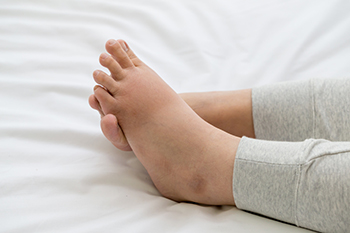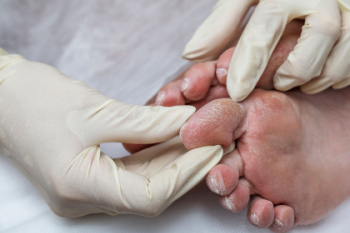Connect With Us
Blog
Items filtered by date: November 2024
Are You Suffering From Nerve Damage?
Foot and Ankle Pain While Cycling

Foot and ankle pain while cycling can stem from several factors. One of the most common causes is improper bike fit, where the saddle height, handlebar position, or pedal alignment may put excessive strain on the feet and ankles. Poorly fitted shoes or stiff insoles can also contribute to discomfort, restricting foot movement and causing pressure points. Another common cause is overuse, where long or intense cycling sessions lead to muscle fatigue and strain. Conditions like Achilles tendonitis or plantar fasciitis can also cause pain in the feet or ankles, often worsened by cycling. Additionally, pedaling mechanics, such as using the wrong cycling shoes or not engaging the right muscles, may lead to joint pain or discomfort. To prevent pain, it is essential to ensure proper bike fit, wear appropriate shoes, and gradually increase cycling intensity. If you enjoy cycling and have endured a foot or ankle injury, it is suggested that you consult a podiatrist who can guide you to effective injury prevention methods.
Ankle and foot injuries are common among athletes and in many sports. They can be caused by several problems and may be potentially serious. If you are feeling pain or think you were injured in a sporting event or when exercising, consult with one of our podiatrists from DM Foot & Ankle Associates . Our doctors will assess your condition and provide you with quality foot and ankle treatment.
Common Injuries
The most common injuries that occur in sporting activities include:
- Achilles Tendonitis
- Achilles Tendon Rupture
- Ankle Sprains
- Broken Foot
- Plantar Fasciitis
- Stress Fractures
- Turf Toe
Symptoms
Symptoms vary depending upon the injury and in some cases, there may be no symptoms at all. However, in most cases, some form of symptom is experienced. Pain, aching, burning, bruising, tenderness, tightness or stiffness, sensation loss, difficulty moving, and swelling are the most common symptoms.
Treatment
Just as symptoms vary depending upon the injury, so do treatment options. A common treatment method is known as the RICE method. This method involves rest, applying ice, compression and elevating the afflicted foot or ankle. If the injury appears to be more serious, surgery might be required, such as arthroscopic or reconstructive surgery. Lastly, rehabilitation or therapy might be needed to gain full functionality in the afflicted area. Any discomfort experienced by an athlete must be evaluated by a licensed, reputable medical professional.
If you have any questions please contact our office located in Lemont, IL . We offer the newest diagnostic and treatment technologies for all your foot and ankle needs.
Changes in Foot Growth During Pregnancy

Many women notice changes in their feet during pregnancy, often leading to the question of whether their feet actually grow. The answer is yes, as hormonal changes and weight gain can cause the ligaments in the feet to relax, leading to a widening and lengthening of the foot. This is largely due to the hormone relaxin, which prepares the body for childbirth by loosening ligaments. Additionally, the increased weight and fluid retention can contribute to swelling. For some women, feet may return to their pre-pregnancy size after childbirth, while others find their feet remain larger permanently. This lasting change can be attributed to factors such as age, genetics, and the amount of weight gained during pregnancy. If you have developed foot pain or other foot problems during your pregnancy, it is suggested that you contact a podiatrist who can offer you effective relief solutions.
Pregnant women with swollen feet can be treated with a variety of different methods that are readily available. For more information about other cures for swollen feet during pregnancy, consult with one of our podiatrists from DM Foot & Ankle Associates . Our doctors will attend to all of your foot and ankle needs.
What Foot Problems Can Arise During Pregnancy?
One problem that can occur is overpronation, which occurs when the arch of the foot flattens and tends to roll inward. This can cause pain and discomfort in your heels while you’re walking or even just standing up, trying to support your baby.
Another problem is edema, or swelling in the extremities. This often affects the feet during pregnancy but tends to occur in the later stages.
How Can I Keep My Feet Healthy During Pregnancy?
- Wearing orthotics can provide extra support for the feet and help distribute weight evenly
- Minimize the amount of time spent walking barefoot
- Wear shoes with good arch support
- Wear shoes that allow for good circulation to the feet
- Elevate feet if you experience swelling
- Massage your feet
- Get regular, light exercise, such as walking, to promote blood circulation to the feet
If you have any questions, please feel free to contact our office located in Lemont, IL . We offer the newest diagnostic and treatment technologies for all your foot care needs.
Understanding Gout in the Heel

Gout is a type of inflammatory arthritis that can cause intense pain and discomfort, often affecting the heel. This condition arises when uric acid levels in the blood become elevated, leading to the formation of sharp crystals in the joints. Symptoms of gout in the heel typically include sudden, severe pain, swelling, and redness in the affected area. The pain may be most intense during the night or early morning, making it difficult to walk or put weight on the heel. Several factors can contribute to the development of gout, including a diet high in purines found in red meats, shellfish, and alcoholic beverages. Other risk factors include obesity, certain medical conditions, and genetic predisposition. If you have heel pain, it is suggested that you consult a podiatrist who can accurately diagnose gout in the heel, and offer you effective relief and treatment solutions.
Gout is a painful condition that can be treated. If you are seeking treatment, contact one of our podiatrists from DM Foot & Ankle Associates . Our doctors will treat your foot and ankle needs.
What Is Gout?
Gout is a form of arthritis that is characterized by sudden, severe attacks of pain, redness, and tenderness in the joints. The condition usually affects the joint at the base of the big toe. A gout attack can occur at any random time, such as the middle of the night while you are asleep.
Symptoms
- Intense Joint Pain - Usually around the large joint of your big toe, and it most severe within the first four to twelve hours
- Lingering Discomfort - Joint discomfort may last from a few days to a few weeks
- Inflammation and Redness -Affected joints may become swollen, tender, warm and red
- Limited Range of Motion - May experience a decrease in joint mobility
Risk Factors
- Genetics - If family members have gout, you’re more likely to have it
- Medications - Diuretic medications can raise uric acid levels
- Gender/Age - Gout is more common in men until the age of 60. It is believed that estrogen protects women until that point
- Diet - Eating red meat and shellfish increases your risk
- Alcohol - Having more than two alcoholic drinks per day increases your risk
- Obesity - Obese people are at a higher risk for gout
Prior to visiting your podiatrist to receive treatment for gout, there are a few things you should do beforehand. If you have gout you should write down your symptoms--including when they started and how often you experience them, important medical information you may have, and any questions you may have. Writing down these three things will help your podiatrist in assessing your specific situation so that he or she may provide the best route of treatment for you.
If you have any questions, please feel free to contact our office located in Lemont, IL . We offer the newest diagnostic and treatment technologies for all your foot care needs.
Foot Care Tips for Diabetic Patients

Proper foot care is vital for diabetic patients, as diabetes can lead to nerve damage and poor circulation, which increase the risk of foot complications. Regularly inspecting the feet for cuts, blisters, or redness is essential, as early detection can prevent serious issues. Keeping the feet clean and dry helps reduce the risk of infections. It is important to moisturize the skin, but avoid applying lotion between the toes to prevent excess moisture. Wearing well-fitted shoes is important to prevent friction and blisters, while checking inside shoes for foreign objects daily can help avoid injuries. Maintaining blood sugar levels within a target range contributes to overall foot health. If you have diabetes, it is strongly suggested that you are under the care of a podiatrist and schedule routine visits. This type of doctor can help you to manage this serious condition.
Diabetic foot care is important in preventing foot ailments such as ulcers. If you are suffering from diabetes or have any other concerns about your feet, contact one of our podiatrists from DM Foot & Ankle Associates . Our doctors can provide the care you need to keep you pain-free and on your feet.
Diabetic Foot Care
Diabetes affects millions of people every year. The condition can damage blood vessels in many parts of the body, especially the feet. Because of this, taking care of your feet is essential if you have diabetes, and having a podiatrist help monitor your foot health is highly recommended.
The Importance of Caring for Your Feet
- Routinely inspect your feet for bruises or sores.
- Wear socks that fit your feet comfortably.
- Wear comfortable shoes that provide adequate support.
Patients with diabetes should have their doctor monitor their blood levels, as blood sugar levels play such a huge role in diabetic care. Monitoring these levels on a regular basis is highly advised.
It is always best to inform your healthcare professional of any concerns you may have regarding your feet, especially for diabetic patients. Early treatment and routine foot examinations are keys to maintaining proper health, especially because severe complications can arise if proper treatment is not applied.
If you have any questions, please feel free to contact our office located in Lemont, IL . We offer the newest diagnostic and treatment technologies for all your foot care needs.
